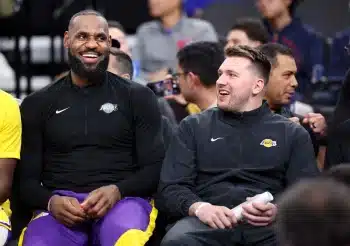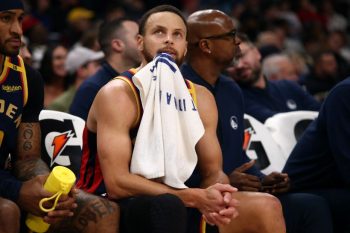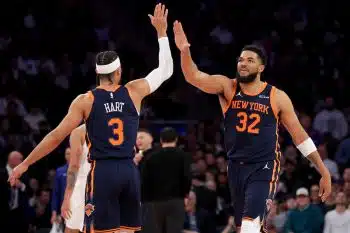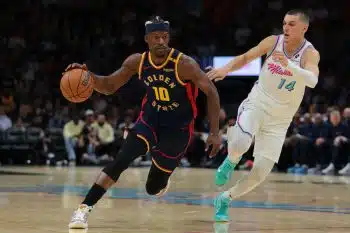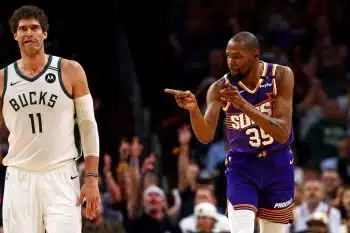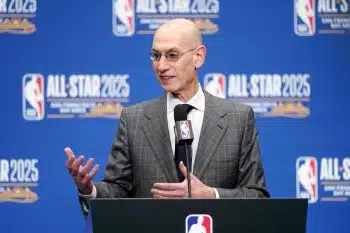NBA
NBA AM: The Cavaliers And Thompson Should Wait
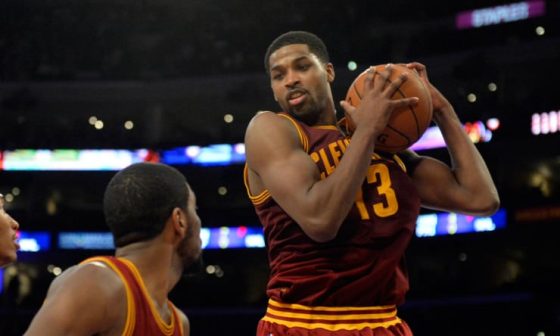
Would Be Smarter To Wait On Thompson: There has been a brewing narrative that the gap between what the Cleveland Cavaliers have offered restricted free agent Tristan Thompson and what his camp is seeking has somehow created a divide. While that’s great theater, that’s simply not where things stand.
Thompson and the Cavaliers had reached an agreement early in free agency that was believed to have been centered on a five-year deal worth some $80 million. The problem with doing a deal at that number is that virtually everyone in Thompson’s talent range got substantially more, most receiving the NBA maximum salary, some for less years, but most for the same year one dollar amount.
Thompson’s camp pulled back from the $80 million number, wanting the Cavs to step up with more based on what virtually everyone else in Thompson’s peer range got. This poses a major problem for the Cavaliers, not because they don’t value Thompson, but because of where they are in the NBA luxury tax structure.
The current Collective Barging Agreement has a graduated tax, which gets progressively more expensive the more a team spends. The goal was to make the penalty associated with overspending more aggressive as the numbers go up.
The Cavaliers currently have $88.631 million in guaranteed salary. That’s $3.891 million over the $84.74 million Luxury Tax line. As a result, the Cavaliers are facing a tax bill of $5.836 million. That figure does not include Thompson, pending free agent J.R. Smith or a potential deal for former Cavalier draft pick Sasha Kaun, who is expected to ink a deal before the start of the season.
Every new dollar the Cavaliers spend will be heavily taxed. Hence the delay in reaching a deal with Thompson.
Thompson has options. The first being he can pick up the $6.777 million Qualifying Offer and play out the season and become unrestricted next year. That’s unfavorable to the Cavaliers as they lose the right match offers next summer and could face the prospect of losing Thompson for nothing in return.
If Thompson picks up the Qualifier, the Cavaliers cap situation balloons up pretty dramatically to $95.408 million in guaranteed salary, which is $10.668 million over the tax line, with a $17.921 million dollar tax bill. That figure still does not include Smith or Kaun signing new deals.
If the Cavs and Thompson compromise on a deal that starts just below the $16.407 million maximum allowed under the cap to something like a starting salary of $15 million, the math changes to $103.631 million in guaranteed money, which is $18.891 million over the tax. That would result in a tax bill of $41.396 million, which still does not include Smith or Kaun.
The issue between the Cavaliers and Thompson is not one of value or one of not wanting to retain him long term, it’s one of economics.
The Qualifying Offer route costs the Cavaliers $6.777 million in salary and $12.085 million in tax, or a total expense of $18.862 million. If Thompson gets the full maximum allowed of $16.407 million now, his salary plus what becomes $46.118 million in tax, the Cavaliers are on the hook for a single year cost of $62.525 million.
Looking at those numbers just for Thompson explains why a deal has not been reached.
As much as the Cavaliers value Thompson, paying $62.525 million to retain him now seem insane, even for a team going all in to win a championship like the Cavaliers are doing.
Now comes the next options for Thompson. He takes his Qualifier and hits free agency next July where the Cavaliers overpay for him. The tax line will be substantially higher and the Cavs can shift more of the expense into Thompson’s deal. The NBA maximum next season for Thompson is being projected at just over $20.5 million. It may seem insane to pay Thompson $20.5 million, but doing a deal at even $15 million now costs $56.39 million because of the tax.
It is much smarter for the Cavaliers to wait and overpay Thompson next year when the tax hit is lower. It may also be smarter for Thompson to wait for next season as he may get more annually by being a good soldier for the Cavs.
The fact that a deal hasn’t been completed doesn’t mean much of anything. The narrative of Thompson leaving next summer if he does not get a deal now is good theater, and certainly an interesting negotiating tactic. However, if the Cavs show up on Thompson’s door step on July 1 2016 with a contract package starting at $18-$19 million per year, that’s substantially more annually than he would get today and likely more than anyone in free agency would offer and it’s still cheaper for the Cavaliers in the long run to take the risk.
As for Thompson, some point to the threat of injury as a reason to ink right away, and while there is nothing like knowing your future is 100% secure, there are loss prevention insurance policies available to players in Thompson’s situation.
Last year a number of the players that passed on early extensions secured one year policies based on the offer they passed on. One player who was offered four years and more than $40 million, insured that value for less than $200,000. If that player had missed more than ten games and could not get a deal for at least four years and $40 million this summer, insurance would have paid the difference.
Thompson isn’t at long-term risk due to injury, so there is really no reason for him to worry about his future. If Thompson wants a MAX level deal, he may have to wait until next July to get it, and for the Cavaliers, getting Thompson to wait saves them a tremendous amount of money, even if they go all the way to MAX next summer. Everyone in the equation understands the math on this and there isn’t animosity as some would try and paint the situation. This is simply the business of being a tax team.
Understanding Your Window: Fans want to see their team’s compete. The dream of the playoffs and ultimately a championship should be the goal every season, and most teams try to foster that mindset as much as their fans do. No one wants to be the losing team or have the worst record in the NBA. That’s never the goal, even for teams that are trying to rebuild, but when it comes to spending money, pursuing free agents and trading away assets, there is a concept that’s easy to overlook and the realistic window to win.
The Philadelphia 76ers get a lot of heat for their rebuild. They have not fielded a very competitive team, as their goals were to grow young talent, obtain high level draft picks, try and build a young foundation and not spend a ton of money doing it. What gets lost in the commentary on the Philadelphia is a simple, but important question. Even if the 76ers were to spend every dollar they could in free agency, and field every veteran they could sign, would they really be in a position to compete for a championship?
The answer is no. The 76ers were never going to be on the same level as the Miami HEAT or the Indiana Pacers when the current leadership took over the team, nor would they be on the same level as the Cavaliers or the Chicago Bulls. Those teams have windows that are wide open for a championship.
So as a team, is it smarter to throw money at being average, or is it smarter to reload with young players and build for your own window? The Portland Trail Blazers have decided that Damian Lillard is their foundational star and that they will surround him with players that are his age so that as a group they can grow together.
The Oklahoma City Thunder have been one of the more consistent winners in the NBA, mainly because they built around a young core and have continued to keep the average age of their roster aligned with their perceived window to compete for a championship.
Timing your team’s window to compete is almost as important as having the pieces. Having great players matters, but even with great players some teams will struggle to overcome teams that have been together longer or have transcendent stars.
If the 76ers, or the Blazers for that matter, spent every nickel this summer and drafted four of the best players in the draft class, none of that would matter this year since neither would beat the Golden State Warriors or the Cavaliers in a playoff series. Neither team’s window is open right now, so wasting resources trying to force the issue isn’t very reasonable.
Now in three seasons, the landscape should be very different for both franchises, simply because time and free agency tend to change the landscape. Unless a superstar shows up as a gift on your doorstep, understanding the timeline you have to win is vitally important.
It’s not fun to lose or to support a losing team, but sometimes it’s smarter to rebuild and take your lumps, because when your window comes open, it could stay open for a while, especially if the team is built the right way.
More Twitter: Make sure you are following all of our guys on Twitter to ensure you are getting the very latest from our team: @stevekylerNBA, @AlexKennedyNBA, @LangGreene, @EricPincus, @joelbrigham, @SusanBible, @TommyBeer, @MokeHamilton, @JCameratoNBA, @iamdpick, @jblancartenba and @CodyTaylorNBA .
